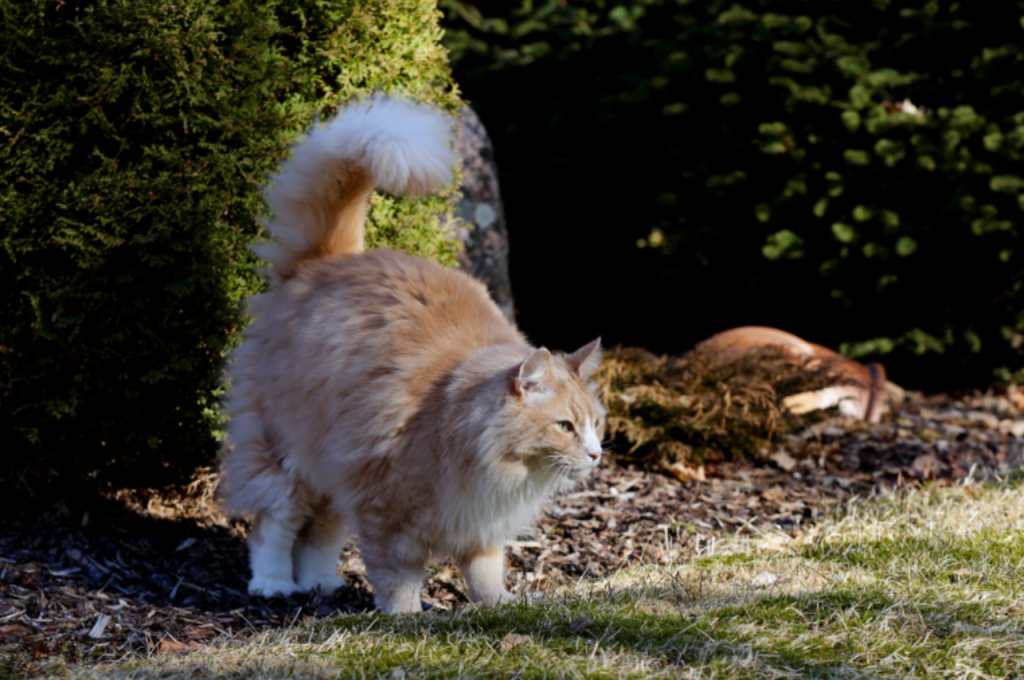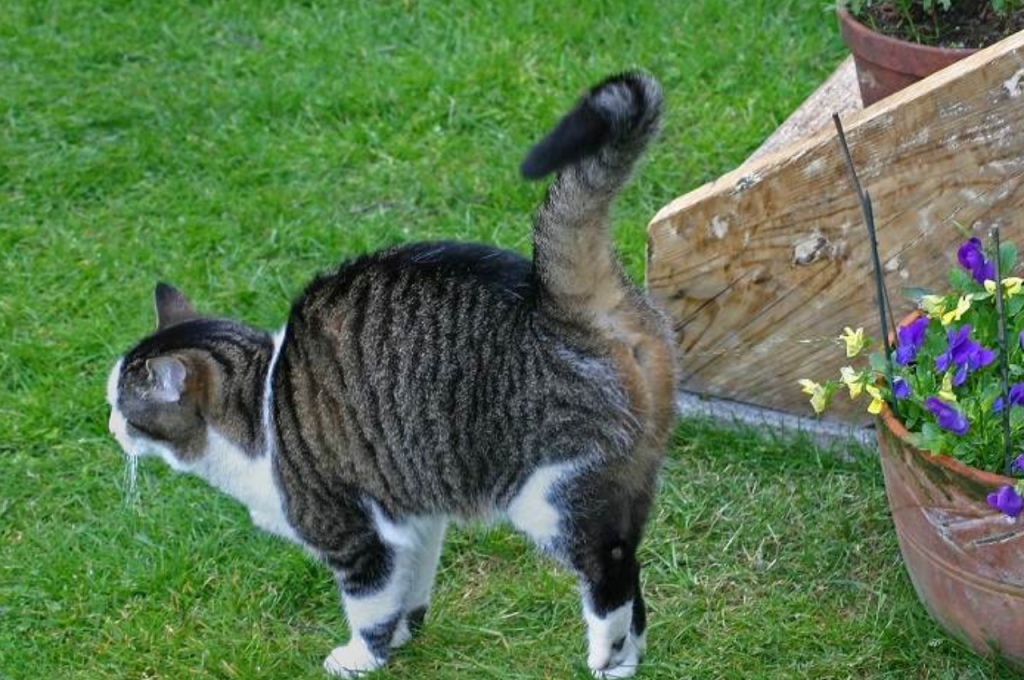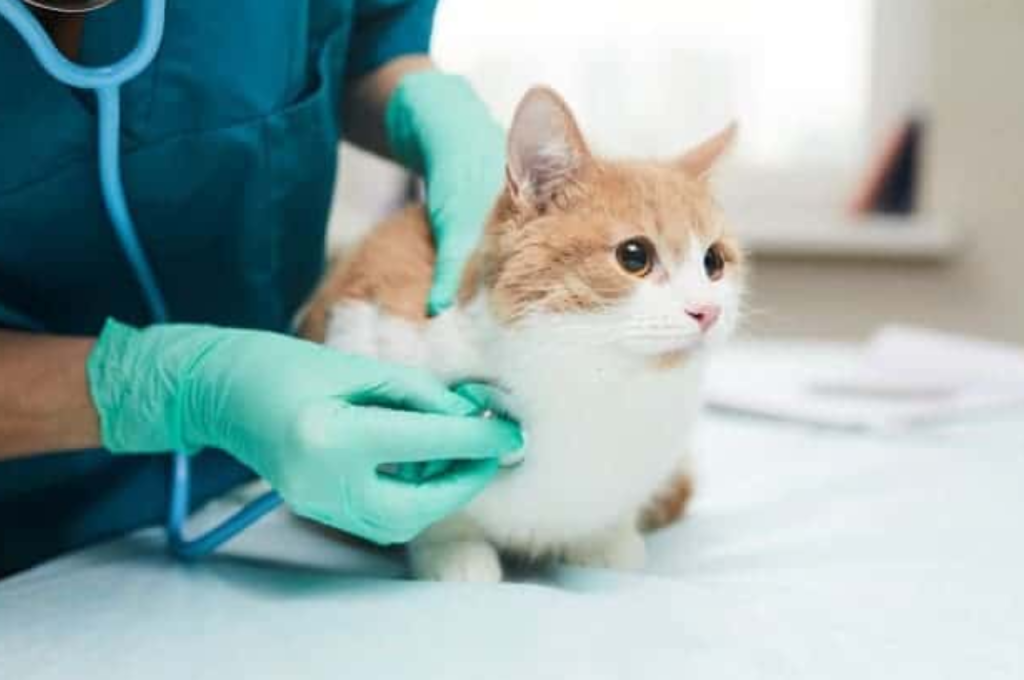To stop a cat from spraying, clean the affected areas thoroughly and address any underlying stress or medical issues. Consistent positive reinforcement and providing enough litter boxes can help deter spraying behavior.
Understanding your cat’s needs and creating a safe environment is key to preventing spraying incidents. Cats may spray due to territorial marking, stress, or changes in routine, so identifying the root cause is essential in addressing the behavior effectively. By implementing these strategies, you can discourage your cat from spraying and maintain a harmonious living space for both you and your feline companion.
Introduction to Feline Spraying
Discover effective ways to stop your cat from spraying with our comprehensive guide on Feline Spraying. Learn proven methods to tackle this behavior and create a harmonious environment for you and your feline companion.

Feline spraying, also known as marking, is a natural behavior for cats. It is a way for cats to communicate with each other, mark their territory, and express their emotions. However, this behavior can become a problem when cats start spraying inside the house. Not only is it unpleasant, but it can also lead to territorial disputes and cause stress in multi-cat households. In this article, we will discuss the natural behavior of cats, how to identify the signs of spraying, and most importantly, how to stop a cat from spraying.
The Natural Behavior of Cats
Cats are territorial animals and have a strong instinct to mark their territory. They use their urine to leave a message for other cats, letting them know that this is their territory. This behavior is more common in male cats, but females can also spray. Feline spraying can occur for a variety of reasons such as:
- Marking their territory
- Attracting a mate
- Showing dominance
- Stress or anxiety
It is important to understand that spraying is a natural behavior for cats, and punishing them for it can cause more harm than good. Instead, we need to find ways to redirect this behavior.
Identifying The Signs of Spraying
The first step in stopping a cat from spraying is to identify the signs. Some common signs of feline spraying include:
- Unpleasant odor of urine
- Urine marks on walls, furniture, or other vertical surfaces
- Increased frequency of urination
- Aggressive behavior toward other cats
- Excessive licking of the genital area
If you notice any of these signs, it is important to take action immediately to prevent the behavior from becoming a habit. In conclusion, feline spraying is a natural behavior for cats, but it can become a problem when they start spraying inside the house. Understanding the natural behavior of cats and identifying the signs of spraying is the first step in stopping this behavior. In the next section, we will discuss some effective ways to stop a cat from spraying.
Medical Causes Behind Spraying
Spraying is a common behavior in cats, often due to medical issues like urinary tract infections or bladder problems. To stop a cat from spraying, it’s crucial to address any underlying medical causes. Consulting a veterinarian for a thorough examination and appropriate treatment is essential in resolving this issue.
If you are a cat owner, you might have experienced your cat spraying in inappropriate places. Spraying is a natural behavior of cats, but it can become a problem when it happens in your home. While behavioral issues are the most common reasons behind spraying, there are also medical causes to consider. In this post, we will focus on the medical causes behind spraying and how to identify them.
Common Health Issues
There are several health issues that can lead to spraying in cats. These include:
- Urinary tract infections (UTIs): Cats with UTIs may experience pain or discomfort while urinating, which can cause them to spray in inappropriate areas.
- Bladder stones: Cats with bladder stones may have difficulty urinating and may also experience pain or discomfort.
- Diabetes: Cats with diabetes may drink more water and urinate more frequently, which can lead to spraying.
- Kidney disease: Cats with kidney disease may have increased thirst and urination, which can also lead to spraying.
When to Consult a Vet
If you notice your cat spraying in inappropriate areas, it is important to consult a vet to rule out any underlying medical conditions. Some signs that your cat may have a medical issue include:
- Increased frequency of urination
- Painful urination
- Blood in urine
- Licking the genital area excessively
- Changes in appetite or water intake
- Lethargy or vomiting
Your vet may perform a physical exam, blood work, and urinalysis to identify any medical issues that may be causing your cat to spray. In conclusion, while behavioral issues are the most common reasons behind spraying, medical causes should not be ruled out. If you notice your cat spraying in inappropriate areas, it is important to consult a vet to identify any underlying medical conditions. By addressing any medical issues, you can help your cat stop spraying and maintain a healthy and happy life.
Stress-related Spraying in Cats
One common reason why cats engage in spraying behavior is due to stress. Cats are sensitive creatures, and they can easily become anxious or overwhelmed in certain situations. When a cat feels stressed, they may resort to spraying as a way to mark their territory and establish a sense of security. As a responsible cat owner, it’s essential to identify the stress triggers and create a calm environment to help prevent stress-related spraying.

Identifying Stress Triggers
To effectively address stress-related spraying, it’s crucial to identify the specific triggers that cause stress in your cat. Cats can be triggered by various factors, such as:
- Loud noises
- Changes in routine
- Introducing new pets or people
- Conflict with other cats
- Lack of stimulation or enrichment
By observing your cat’s behavior and noting any changes or patterns, you can pinpoint the factors that contribute to their stress. Once you identify these triggers, you can take appropriate steps to address them and minimize their impact on your cat’s well-being.
Creating a Calm Environment
A calm and stress-free environment is essential in preventing spraying behavior in cats. Here are some strategies to create a peaceful atmosphere:
- Provide hiding spots: Cats feel more secure when they have secluded areas to retreat to. Place cat condos or covered beds in different areas of your home.
- Establish a routine: Cats thrive on predictability. Stick to a consistent feeding schedule and maintain a regular playtime routine to reduce anxiety.
- Use pheromone sprays: Feline pheromone sprays, available at pet stores, can help create a calming atmosphere and reduce stress-related spraying.
- Offer vertical spaces: Cats feel safer when they can climb and observe their surroundings from above. Install cat trees or shelves to provide vertical spaces.
- Provide mental stimulation: Engage your cat in interactive play sessions and offer puzzle toys to keep their minds stimulated and prevent boredom.
By implementing these strategies, you can create a serene environment that promotes your cat’s overall well-being and reduces the likelihood of stress-related spraying.
Behavioral Factors and Territory Marking
Understanding the behavioral factors and territory marking of cats is crucial in addressing spraying issues. Cats spray as a way of marking their territory, communicating with other cats, and expressing their emotions. By delving into the underlying reasons for this behavior, you can effectively mitigate spraying and create a harmonious environment for your feline friends.
Understanding Territorial Instincts
Cats have a strong natural instinct to mark their territory. They do this by spraying urine as a means of establishing boundaries and communicating with other cats. This behavior is more prevalent in unneutered or unspayed cats, as the urge to mark territory is heightened due to hormonal influences. Understanding these territorial instincts is crucial in addressing spraying behavior.
Managing Multi-cat Households
In multi-cat households, territorial conflicts can trigger spraying behavior. Creating a harmonious environment requires strategic management of the living space and resources. Providing separate feeding areas, litter boxes, and cozy resting spots for each cat can help minimize territorial disputes and reduce the likelihood of spraying.
Importance of Neutering or Spaying
Neutering or spaying is crucial to prevent cats from spraying. This procedure helps control their hormone levels and reduces territorial marking behaviors, ensuring a cleaner and more peaceful home environment.
Best Time for The Procedure
The best time to neuter or spay a cat is typically before they reach sexual maturity. Neutering or spaying your cat is crucial in preventing unwanted spraying behavior. This procedure involves removing the reproductive organs of the cat. Neutering refers to the removal of the testicles in male cats while spaying involves removing the ovaries and uterus in female cats.
Best Time for The Procedure
The best time to neuter or spay a cat is typically before they reach sexual maturity.
Cleaning and Removing Spray Odors
When it comes to dealing with a cat that’s spraying, cleaning and removing the lingering spray odors is essential to discourage the behavior from repeating. Cats are territorial creatures, and when they spray, they are marking their territory with their scent. Removing the odor is crucial to prevent them from respraying in the same spot.
Choosing The Right Cleaning Solutions
To effectively remove the spray odors, select cleaning solutions specifically designed to neutralize the odor and break down the chemical compounds in the cat spray. Look for enzymatic cleaners or cleaners specifically formulated for pet odors, as they are designed to eliminate the scent rather than just mask it.
Preventive Measures to Discourage Respraying
Alongside cleaning, there are preventive measures to discourage respraying. Consider using deterrents such as citrus-scented sprays or aluminum foil placed in the sprayed area to discourage the cat from returning to that spot. Additionally, providing multiple litter boxes in different areas of the house can help reduce territorial stress and discourage spraying behavior.
Training and Positive Reinforcement
Cats may spray urine for various reasons, including marking their territory or feeling stressed. To effectively address this behavior, training, and positive reinforcement are essential. By using the right techniques and rewards, you can discourage spraying and encourage positive behavior in your feline friend.
Effective Training Techniques
When training your cat to stop spraying, it’s important to use gentle and consistent methods. Redirect your cat’s attention away from potential spraying triggers, such as other animals or territorial disputes, by engaging them in interactive play or providing new toys. Additionally, consider creating a comfortable and secure environment for your cat, as this can help reduce stress and the urge to spray.
Rewards and Consistency
Positive reinforcement is a key aspect of training your cat to stop spraying. Reward your cat with treats, affection, or playtime when they exhibit desirable behaviors, such as using the litter box instead of spraying. Consistency is crucial in reinforcing these positive behaviors, so be sure to praise and reward your cat each time they chooses appropriate elimination methods.
Advanced Solutions and Professional Help
When it comes to addressing a cat’s spraying behavior, advanced solutions and professional help can offer effective strategies. Here are some options for addressing this challenging issue.

Pheromone Diffusers and Sprays
Pheromone diffusers can help to create a calming environment for your cat, reducing the likelihood of spraying. These diffusers release synthetic pheromones that mimic those produced by a nursing mother cat, promoting a sense of security and reducing stress. Additionally, pheromone sprays can be used on specific areas where your cat has sprayed to discourage repeat marking.
Seeking Behaviorist Consultation
If your cat’s spraying behavior persists despite your efforts, seeking behaviorist consultation can provide valuable insights and customized strategies. A qualified behaviorist can conduct a thorough assessment of your cat’s environment and behavior, offering tailored recommendations to address the underlying causes of spraying.
Conclusion: Long-term Strategies for Prevention
Regular Check-ups: Consistent veterinary check-ups are crucial for monitoring your cat’s health and addressing any potential medical issues that may contribute to spraying behavior.
Maintaining a Stable Routine: Cats thrive on predictability, so sticking to a regular feeding schedule, playtime, and litter box maintenance can help reduce stress and minimize the likelihood of spraying.
Frequently Asked Questions
Here is a commonly asked question about how to stop a cat from spraying:
How Do I Get My Cat to Stop Spraying?
To stop your cat from spraying, first identify the underlying cause, such as stress or marking territory. Spaying/neutering can also help. Use enzymatic cleaners to remove any previous markings and provide multiple litter boxes. Consider pheromone sprays or diffusers and provide plenty of attention and playtime to reduce stress. Consult with a veterinarian if the behavior persists.
What Home Remedy Will Keep Cats from Spraying?
Citrus scents, such as orange or lemon, can deter cats from spraying. Mix fresh citrus juice with water and spray it in areas where cats tend to spray. White vinegar and water mixture can also be used to clean the areas where cats have sprayed. Providing clean litter boxes and enough playtime can also prevent spraying.
Do Cats Eventually Stop Spraying?
Yes, cats can stop spraying once they are neutered or spayed. Consistent training and a stress-free environment can also help prevent spraying behavior.
Can You Remove a Cat’s Ability to Spray?
Yes, you can remove a cat’s ability to spray through a procedure called neutering or spaying. This is a common practice to prevent cats from marking their territory and reduce unwanted behaviors. It is a safe and effective way to control spraying in cats.
Conclusion
Addressing the issue of cat spraying requires a combination of understanding the underlying causes and implementing effective solutions. By providing a comfortable environment, maintaining proper hygiene, and seeking professional advice if necessary, you can successfully prevent your cat from spraying.
